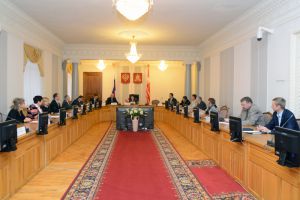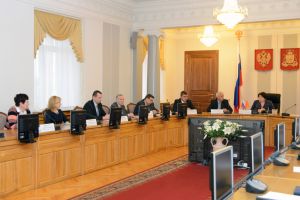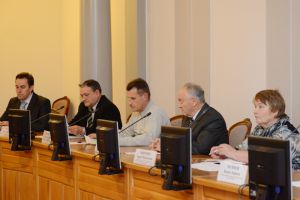The interethnic situation in Smolensk region is stable

 Today the working group on harmonization of interethnic relations in Smolensk region discussed issues of implementation of the state national policy of the Russian Federation on the territory of the region. The meeting was attended by the representatives of authorities, national and cultural associations and religious organizations of Smolensk region.
Today the working group on harmonization of interethnic relations in Smolensk region discussed issues of implementation of the state national policy of the Russian Federation on the territory of the region. The meeting was attended by the representatives of authorities, national and cultural associations and religious organizations of Smolensk region.
The speakers noted that despite the fact that the region is multi-ethnic and multi-confessional, the interethnic situation in Smolensk region is stable and controllable. At the moment people of more than 100 nationalities and ethnic groups live in Smolensk region, due to historical and geographical background. Russian population is the most numerous - 94.7 % (according to the 2010 census), the Ukrainians make up 1.29 % of the total population, the Belarusians - 1.27 %, other nationalities - less than 3%. Of all the registered religious groups Orthodox are 80 %, 20% belong to other confessions. 20 non-profit organizations represent the interests of ethnic communities in the region.
 According to Head of the Information Policy and Public Relations Chief Directorate of Smolensk region Natalia Isaychenkova, the interaction of state authorities of the region and the national associations is of great importance for ensuring international peace and harmony. The effective instrument of such interaction is the Public Chamber of Smolensk region, which has become a platform for public debate on pressing social issues that concern people of different nationalities and confessions. The authorities are constantly monitoring the state of ethnic relations, holding regular meetings with the leaders of the national and ethnic unions and public organizations.
According to Head of the Information Policy and Public Relations Chief Directorate of Smolensk region Natalia Isaychenkova, the interaction of state authorities of the region and the national associations is of great importance for ensuring international peace and harmony. The effective instrument of such interaction is the Public Chamber of Smolensk region, which has become a platform for public debate on pressing social issues that concern people of different nationalities and confessions. The authorities are constantly monitoring the state of ethnic relations, holding regular meetings with the leaders of the national and ethnic unions and public organizations.
The Concept of Smolensk region Migration Policy for the period up to 2025 approved in April 2013, as well as long-term regional target program "Supporting voluntary resettlement in Smolensk region of compatriots living abroad" for 2013 – 2018 and "Supporting socially-oriented non-profit organizations in Smolensk region" for the years 2011-2013 play an important role in addressing issues of inter-ethnic relations in the region.
 In order to implement the state Cossacks policy in Smolensk region there is the Coordination Council for the Cossacks affairs in the regional Administration. In 2010 the regional divisional Cossack community of the Cossack Army Society "Central Cossack army” was established in the regional center. The Cossacks are actively involved in the social life of the region, including the assistance to law enforcement agencies in the protection of public order.
In order to implement the state Cossacks policy in Smolensk region there is the Coordination Council for the Cossacks affairs in the regional Administration. In 2010 the regional divisional Cossack community of the Cossack Army Society "Central Cossack army” was established in the regional center. The Cossacks are actively involved in the social life of the region, including the assistance to law enforcement agencies in the protection of public order.
Speaking about maintaining stable interethnic situation in the region, the participants of the meeting noted that the keeping interethnic and interreligious peace requires further joint work of the organizations and authorities of Smolensk region. The working group agreed that, first of all, it is necessary to develop a regional action plan to implement in the 2014-2015 the Strategy of the State Ethnic Policy of the Russian Federation for the period up to 2025, as well as the regional program to strengthen the unity of the Russian nation and harmonization of interethnic relations.
